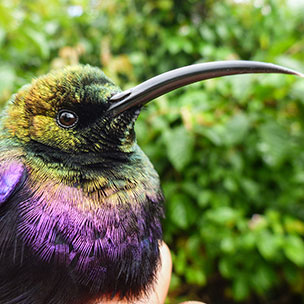February 13, 2015 — When it comes to shade-grown coffee, “there is shade and there is shade,” says University of Utah biologist Çağan Şekercioğlu. At least for birds, anyway. In research published at Biological Conservation Feb. 11, Şekercioğlu, doctoral student Evan Buechley and colleagues found that at study sites in southwestern Ethiopia, all bird species found in intact forests were also found in shade-grown coffee farms, suggesting that “Ethiopian shade coffee is perhaps the most ‘bird-friendly’ coffee in the world.”
The researchers found that certain specialized birds, such as insect-eaters, appeared more frequently in nearby forests than in the coffee farms. That could be an important finding for coffee farmers, because those birds could minimize the need to use costly pesticides. But birds that aren’t specialists and can live in different environments were found in greater numbers in the shade coffee farms than in the forests, pointing to the farms’ significance for migratory birds. Overall, bird species diversity (a measure of both number of birds and number of species) was similar for the coffee farms and forest sites, but species richness — the number of species — was higher on the farms.
Şekercioğlu attributes the finding to the fact that coffee is native to Ethiopia — the only one of the world’s top 10 coffee-exporting countries for which this is the case. “It is grown where it belongs in its native habitat with native tree cover and without chemicals,” he said in a press release. That setting, he says, creates a far friendlier habitat for birds than nonnative coffee grown under nonnative trees.
Most importantly, the study underscores the value of shade coffee farms broadly for bird conservation and the importance of preserving intact forest alongside coffee farms. “Conserving all types of forested habitat is increasingly important for biodiversity conservation in the tropics,” the researchers concluded.
![]()
Photo of a Tacazze sunbird — which was caught and released during the study — by Evan Buechley.
Ensia shares solutions-focused stories free of charge through our online magazine and partner media. That means audiences around the world have ready access to stories that can — and do — help them shape a better future. If you value our work, please show your support today.
Yes, I'll support Ensia!
